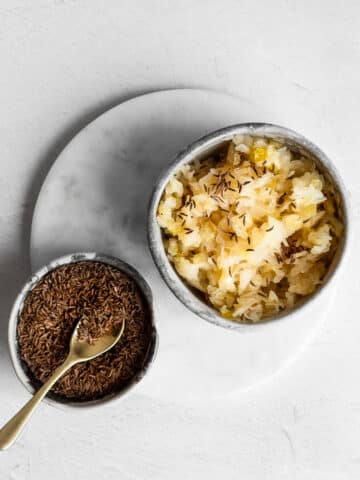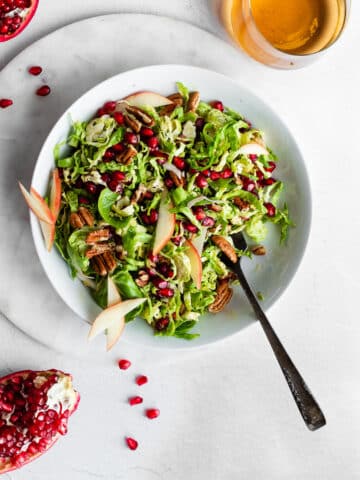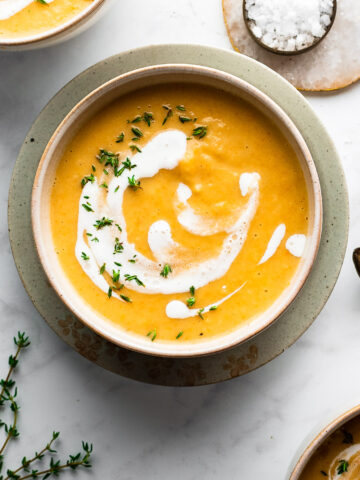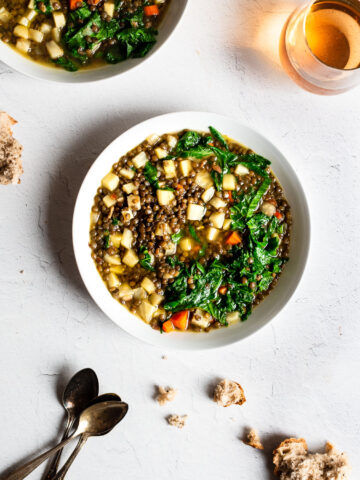Homemade potato chips find their way to our kitchen only very rarely, but what a heavenly indulgence when they do appear. You see, I’m a potato chip addict. I may blend a killer kombucha, spend my afternoons brewing water kefir, and culturing raw milk yogurt, but it’s the humble potato chip: salty, crunchy, and wonderfully greasy that will always have my heart.
Jump to Recipe

I take after my mother that way. That woman never met a potato chip she didn’t like, and in the summer on the tiny island where I grew up, we’d file into a rusted-out banana-yellow sleeper van and ride from the airbase to the beach at the other side of the island. And while I’d muster all the grade-school patience I could, that drive seemed an eternity though the island, tip-to-tip, was only seventy miles long. Those were the long days of summer, hazy and hot and wet. We’d spend hours in the water only to come to shore and eat peanut butter sandwiches gritty with coral sand. At night time, we’d stay up late playing Shanghai Rummy eating potato chips slathered in French onion dip. For me, the humble potato chip evokes these memories so strongly that in one bite, I can remember the darkened bungalows at the beach, the briny smell of the sea, and the rhythmic washing of the waves as they crashed upon the shore just outside our room.
We’ve given up potato chips, more or less; they’re loaded with nasty stuff: refined vegetable oils, genetically engineered ingredients, MSG, refined salts. I still can’t help myself, though. I crave them: the crunch, the salt, the greasy fingertips. It’s not so much that the potato chip is unhealthy food, but, rather, what we’ve done with it. A potato, on its own, is a beautiful thing – capable of sustaining life in the Andes until it was brought from the new world to the old and found itself welcomed all over Europe, but perhaps in Ireland and Germany the most. The challenge then is the processing. The use of unhealthy, solvent-extracted genetically engineered vegetable oils like soybean and cottonseed oils that are used to make snack foods instead of the traditional fats that have nourished humans for thousands of years like butter, lard from pastured pigs, tallow from grass-fed cattle, coconut, and palm kernel oils.
Lard gets a bad rap. It’s an unloved fat, but one that deserves cherishing. When the lipid hypothesis of the mid-twentieth century took hold, lard was on the outs and still remains on the outs despite our new-found (and well-deserved) infatuation with tropical oils like coconut oil. It’s a shame. At the turn of the twentieth century when diabetes rates were low and cardiovascular disease was almost unheard of and before the processed vegetable oil industry skyrocketed, lard and butter were the darlings of the home cook, the primary source of fat in the diet. Indeed, no one had heard of cottonseed oil, canola oil hadn’t yet been invented and folks were thriving in good health on eggs fried in bacon fat, fruit pies with lard-crust, and foods fried in grass-fed tallow. The only liquid vegetable consumed in any quantity was olive oil. Lard nourishes, it’s potently rich in vitamin D and primarily composed of monounsaturated fat – the very fat that makes olive oil and avocados so healthy. So give it up grapeseed and canola oil fans, and learn to use traditional fats. They taste better anyway and you can render lard at home easily.





Sparkle W says
Why are the ingredients and the Instructions the same? I don't see the directions. Am I missing Something
Jenny says
They're the same because an assistant years ago copied them incorrectly when transferring the recipe from our old system to the new one. I haven't corrected it because I haven't prioritized it.
Gail says
Where can I find the instructions to making the chips? You have only listed the ingredients twice....
Mary Bee says
I think there was a mistake with your website, the ingredients were duplicated into the instructions! I'd love to make these, they sound amazing
Debsy says
I would love to try this recipe. My mother used to make chips for us when we were kids (and donuts and icecream!) For some reason your instructions are missing and the ingredients are listed twice. can you repost the instructions or email them to me? I would love to surprise my mother with a healthy batch of chips!
Lucinda says
I wish there was a recipe too!
Rhiain says
Hi Jenny -
This recipe doesn't actually list the instructions (ingredients are duplicated), so I'm not clear on what I should be doing with the starter culture. Do I slice the potatoes and soak for 1 or 2 days? Potato chips are my weakness and I can't wait to try and make my own!
Also, do you think those natural chips that aren't fermented are bad because of the acrylamide - even though they're cooked in better oils like coconut and avocado? For example, Jackson's Honest Chips?
Thanks!!
Helena says
I am curious what this infusion with bacteria does for the potatoes as the bacteria would all die off in the cooking.
Jenny says
As you know, because you read the post and notes, the fermentation process reduces acrylamide formation.
Katie says
I am confused about the "covering". Am I covering the potatoes with the water/culture mixture or with a tea towel/lid?
If it is the water, given that amount of potatoes I didn't have enough water mixture to cover them. Do I just keep adding water until they are covered? Do I have to keep the water culture mixture proportions intact and add more culture too?
Thanks!!!
Jenny says
This is what I use. A salt brine isn't sufficient for this recipe, you really want to infuse it with bacteria. Using whey or sauerkraut juice would also help.
Bethany says
What is it that you use, Mrs. Jenny?
Janine says
Can you make them without fermenting them first? Why do you ferment potatoes?
Maria says
Hi There! These look amazingly delicious, I cannot wait to make them. However I dont have a starter culture. Would kefir grains work fine as a starter?
Thanks!
Michelle says
What is a "starter culture"?
Hugo says
What type of starter culture do you use?
Stephanie says
Why do you have to return them to the fry pan again for another 30 to 45 seconds after you have taken them out and drained them?
Jenny says
To crisp them. Otherwise they can be soggy.
Rochel says
What is the starter culture you mention in the recipe?
Rachel says
Sounds delicious & I really like the idea of fermenting the potatoes. Would it be ok to ferment the potatoes in a simple salt brine?